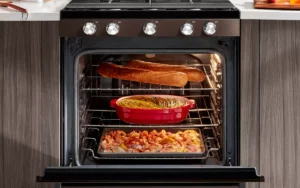Your dishwasher is a hardworking appliance, making daily life easier by handling the dirty dishes for you. But like all appliances, it won’t last forever, and there comes a time when it may need repair—or even replacement. If you’re noticing some changes in your dishwasher’s performance, you might wonder whether it’s time for a simple fix or if you should start shopping for a new model. Here are the key signs to help you determine whether your dishwasher needs repair or replacement.
1. Dishes Aren’t Coming Out Clean
One of the clearest signs of dishwasher trouble is when your dishes aren’t coming out as clean as they should be. If your dishwasher used to leave dishes sparkling clean but now they come out still dirty, greasy, or covered in soap residue, something may be wrong.
- Common causes: Clogged spray arms, a faulty water inlet valve, or worn-out seals can all impact cleaning performance. The heating element, responsible for heating the water, could also be malfunctioning, leading to improper cleaning.
- When to repair: If the issue is caused by dirty spray arms, clogged filters, or a simple part replacement (such as the inlet valve), a repair may be all you need. Running a cleaning cycle with vinegar and checking for blockages can also improve performance.
- When to replace: If your dishwasher’s overall performance continues to decline despite troubleshooting and repairs, it may be time to replace it, especially if the machine is older than 10 years.
2. Strange Noises During Operation
Dishwashers typically make some noise, but if you’re hearing new, strange sounds—like grinding, thumping, or banging—it’s time to investigate.
- Common causes: These noises could indicate a problem with the motor, a broken pump, or something stuck in the dishwasher’s drain or spray arms.
- When to repair: If the noise is caused by a blockage in the drain or spray arms, you may be able to fix the issue by cleaning out debris. Replacing a worn motor or pump may also restore normal operation.
- When to replace: If the motor is failing and the repair costs are high (especially if the dishwasher is older), replacing the appliance may be the more cost-effective option.
3. Water Leaks
A leaking dishwasher is a serious issue that can cause damage to your kitchen floor or cabinets if left unchecked. If you notice water pooling around the base of your dishwasher or dripping from the door, it’s important to address the issue quickly.
- Common causes: Worn door seals or gaskets, loose connections, a broken float switch, or a faulty water inlet valve can all cause water leaks.
- When to repair: Minor leaks caused by damaged seals or loose connections can often be repaired easily. Replacing a gasket or tightening a connection can solve the problem.
- When to replace: If the leak is coming from the bottom of the dishwasher or the tub itself has cracked, replacement may be necessary. Extensive water damage or flooding caused by internal malfunctions may also warrant getting a new unit.
4. Standing Water in the Dishwasher
At the end of a wash cycle, you should never see standing water at the bottom of the dishwasher. If you’re left with a pool of dirty water, something is likely blocking the drainage system.
- Common causes: Clogs in the drain hose, filter, or drain pump are the most common reasons for standing water. It could also be due to a malfunctioning drain pump or a faulty motor.
- When to repair: In many cases, simply cleaning out the drain hose or filter will fix the problem. If the pump is clogged or broken, replacing it may also resolve the issue.
- When to replace: If the pump or motor fails completely or the dishwasher is old and prone to frequent draining issues, it may be time to consider a new dishwasher.
5. The Door Doesn’t Latch or Seal Properly
A dishwasher door that doesn’t latch or seal properly is not only frustrating but also prevents the appliance from functioning correctly. Without a secure latch, water and steam can escape, leading to poor cleaning results and potential leaks.
- Common causes: A broken door latch, worn-out seals, or misaligned hinges could be to blame for the problem.
- When to repair: Replacing a faulty door latch or worn seals is usually a straightforward repair. Realigning the door hinges can also fix the issue.
- When to replace: If the door itself is damaged or the repairs become frequent and costly, replacing the dishwasher may be more cost-effective.
6. The Dishwasher Doesn’t Drain Properly
If your dishwasher isn’t draining completely, you might notice leftover water at the bottom after a cycle. This can be a sign of a drainage problem or malfunctioning parts.
- Common causes: A clogged drain hose, a malfunctioning drain pump, or a faulty motor could be causing the drainage issue.
- When to repair: In many cases, clearing a clog in the drain hose or cleaning the filter will fix the problem. If the pump is malfunctioning, replacing it may also solve the issue.
- When to replace: If the motor or pump is consistently malfunctioning or if the dishwasher is old and prone to draining problems, it may be time for a replacement.
7. Foul Odors That Won’t Go Away
If your dishwasher smells bad even after cleaning it or running a cleaning cycle, it could indicate a buildup of bacteria, mold, or mildew in hard-to-reach areas.
- Common causes: Leftover food particles, grease buildup, or stagnant water can cause unpleasant odors.
- When to repair: Start by cleaning the filter, spray arms, and seals. Running a cycle with vinegar and baking soda can help eliminate odors. If the smell persists, it may be due to an internal issue like a clogged drain or pump that needs professional attention.
- When to replace: If the smell continues despite cleaning and repairs, it may be a sign of a larger issue with the dishwasher’s internal components, and replacement might be the better option.
8. It’s Over 10 Years Old
While dishwashers can last longer than 10 years, this is generally the age when they start experiencing more frequent problems and become less efficient.
- Energy efficiency: Newer dishwashers are much more energy- and water-efficient, saving you money on utility bills over time. Older models may use more water and electricity, making them costlier to operate.
- Frequent repairs: If your dishwasher is requiring constant repairs and it’s over 10 years old, it may be more economical to replace it rather than continue fixing each new problem.
- Outdated features: Newer dishwashers come with advanced features like improved energy efficiency, quieter operation, and more cleaning options. If your older model is missing these conveniences, upgrading could improve your overall kitchen experience.
9. High Repair Costs
One of the most important factors to consider is the cost of repairing your dishwasher compared to the cost of buying a new one.
- When to repair: If the repair is relatively inexpensive and your dishwasher is still under warranty, it makes sense to fix the issue. This is especially true for newer models that are only a few years old.
- When to replace: If the cost of repairing the dishwasher is 50% or more of the cost of buying a new one, it’s probably time to consider a replacement. At that point, investing in a new, more energy-efficient model is likely the better choice.
10. Water or Electric Bill Increases
If your water or electric bills have noticeably increased without a clear reason, your dishwasher may be operating inefficiently. This could be due to worn-out parts, clogged hoses, or a malfunctioning motor.
- When to repair: If a specific part is causing the inefficiency, such as the water inlet valve or heating element, replacing that part may solve the problem.
- When to replace: If the dishwasher is an older model and its inefficiency is affecting your utility bills, replacing it with a new energy-efficient model can save you money in the long run.
Final Thoughts: Repair or Replace?
When deciding whether to repair or replace your dishwasher, consider the age of the appliance, the severity of the issue, and the cost of the repair. Minor problems like clogged filters or worn seals can often be repaired easily and affordably, but if your dishwasher is over 10 years old and experiencing frequent issues, replacing it may be the better long-term solution. By keeping an eye on these warning signs, you can make an informed decision and ensure your dishwasher continues to serve you well for years to come.









